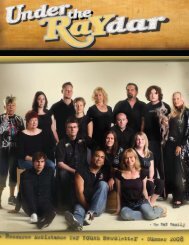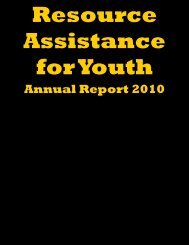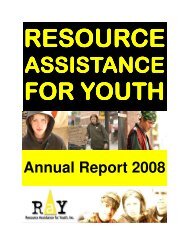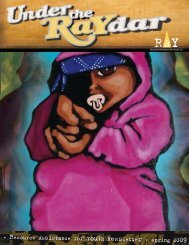By Kelly Holmes and Jason Neufeld - Resource Assistance for Youth
By Kelly Holmes and Jason Neufeld - Resource Assistance for Youth
By Kelly Holmes and Jason Neufeld - Resource Assistance for Youth
- No tags were found...
Create successful ePaper yourself
Turn your PDF publications into a flip-book with our unique Google optimized e-Paper software.
<strong>By</strong> <strong>Kelly</strong> <strong>Holmes</strong> <strong>and</strong> <strong>Jason</strong> <strong>Neufeld</strong>What does “street culture” mean to you? What sorts of imagesdoes the term evoke? A ball cap askew, squeegee kids on thecorner, car thieves trolling dark streets, gang members moving inpacks, sex trade workers on Ellice, panh<strong>and</strong>lers with sad stories,drug-addicts skulking through back-alleys, con-artists looking<strong>for</strong> their next scam, or all of the above? One aspect of streetculture that is often ignored <strong>and</strong> rarely spoken of is the life ofthe traveller. You’ve all seen them. They’re easy to spot, withtheir dreadlocks <strong>and</strong> their tattered army fatigues, their tattoos<strong>and</strong> tribal piercings <strong>and</strong> their loyal dogs by their sides. They looklike they’ve stepped out of a punk-rock version of some postapocalypticHollywood movie. Living their life outdoors, theyare wind-burnt with soil jammed under their fingernails <strong>and</strong> dirtground into their calloused h<strong>and</strong>s <strong>and</strong> feet. It’s as though theyhave grown out of the earth itself.Not unlike youth of past generations, these travellers are trulyanti-establishment. For one reason or another they exist on theouter fringes of society. Theirs is a culture that doesn’t judge anindividual in the way we are used to in mainstream society. Intheir world, an individual doesn’t score points <strong>for</strong> the numberof toys that they possess or the size of their house or the levelof education attained. This is a culture that values the power ofcommunity; you share what you have, you get what you need.All of them unique. All of them similar. They are a tribe of sorts.Although some may be running from their past, they fully embrace<strong>and</strong> live authentically in the present. They have establishedcomplex <strong>and</strong> varied modes of employment, communication <strong>and</strong>travel that are uniquely part of their world <strong>and</strong> their culture—street culture. It’s a culture that transcends borders, race, religion<strong>and</strong> gender. These youth come from varied backgrounds—somefrom wealthy homes, others from abject poverty. They are asymptom of our society—our creation. How can we judge them?They choose to ab<strong>and</strong>on their birth names <strong>and</strong> adopt vulgarlabels—Crusty, Barf, Spaz—names that reflect how society haslabelled them.The tattoos, the piercings, the grime <strong>and</strong> the stink all act as arepellent to those whom they cannot trust (they are continuallyhassled, stalked <strong>and</strong> interrogated by police from city to city <strong>and</strong>issued $200 fines <strong>for</strong> petty violations in an ef<strong>for</strong>t to “clean up”the streets—an act meant to appease tourists <strong>and</strong> suburbanites).These youth have built heavy armour to protect themselves froma society that has ab<strong>and</strong>oned them. Although they are often onlyaround <strong>for</strong> days at a time, we at RaY are privileged that they havelet their guards down, even <strong>for</strong> a short time, in our presence. Weknow that we don’t often know the whole story, <strong>and</strong> sometimeswe wish we had more time to build relationships, but we hopethat even in those brief encounters we can show these youngpeople that we underst<strong>and</strong>.At RaY we applaud the ingenuity <strong>and</strong> resilience of the travellers.We respect the quiet dignity they possess <strong>and</strong> their stubbornsolidarity. We have to ask ourselves, however, if this way of lifeis actually a conscious choice towards freedom or a prison theyhave created <strong>for</strong> themselves. Do we accept this way of life, or dowe actively intervene? When it comes to the travellers, it is a bitof a conundrum. While we want to be respectful of a carefullycrafted culture—one that is built as a way to be left alone—wefeel compelled to present what we feel is a healthier alternative.Because street life is not safe—this much we know. The balancebetween respecting street culture while advocating <strong>for</strong> thetravellers betterment continues to be a difficult struggle <strong>and</strong> alearning experience.“All of them unique. All of them similar. They are a tribe of sorts.”1







